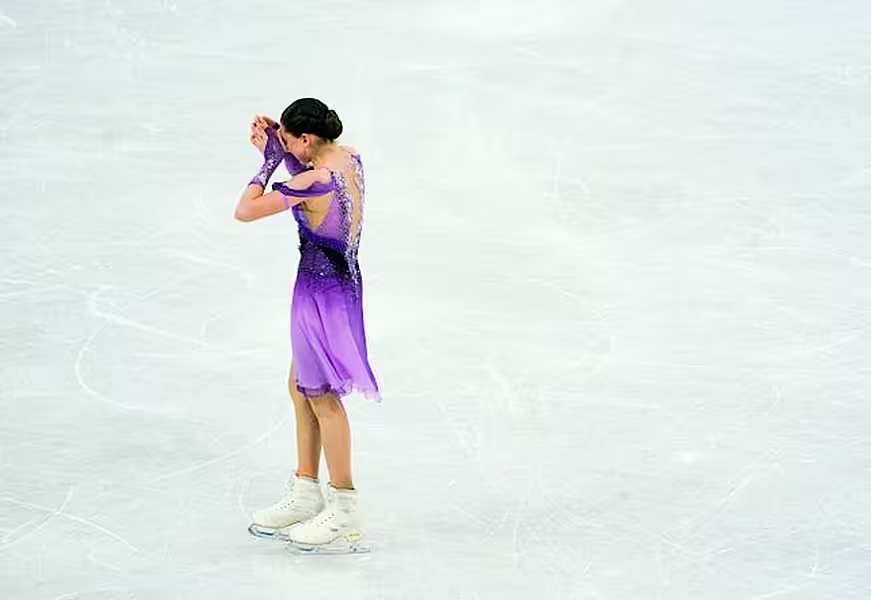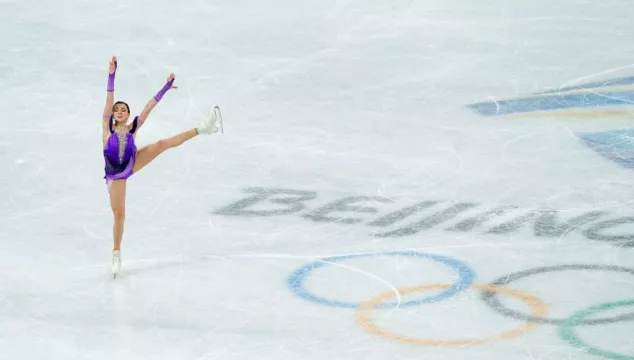The strains of Ravel’s ‘Bolero’ will echo around an Olympic figure skating arena again on Thursday night, but it will be met with little of the acclaim that greeted Torvill and Dean’s unprecedented string of sixes 38 years ago almost to the day.
The free skate routine of 15-year-old Kamila Valieva, nicknamed ‘Miss Perfect’, should be strong enough to see her to convert her narrow lead after the short programme into a victory which will be greeted, not with a gold medal and a flower ceremony, but an asterisk and a stack of unanswered questions.
The extraordinary sanction by the International Olympic Committee – which also applies to the team event in which Valieva competed last week – has been applied pending the outcome of an investigation into a positive test she submitted for the banned heart medication trimetazidine on Christmas Day.

Valieva scored 82.16, her lowest of the season, on Tuesday night, but it was still enough for top position ahead of fellow Russian Anna Shcherbakova. She will include three quad jumps in her free skate programme, a standard of which only Valieva and her compatriots, Shcherbakova and fourth-placed Alexandra Trusova, all of whom hail from the same Sambo-70 club in Moscow, can conceive.
Not only will the medals not be presented if, as is virtually certain, Valieva finishes in the top three, but the IOC confirmed an asterisk would be applied, at least temporarily, beside her name in the record books.
“There will be an asterisk about the results on Friday because they will be preliminary,” IOC spokesman Mark Adams confirmed at his daily briefing on Wednesday morning.

“This case has not yet concluded and the CAS (Court of Arbitration for Sport) have made that very clear. In fact, as far as I know, the B sample hasn’t even been opened, so I think drawing conclusions like this at this stage is really inappropriate.”
Anger about Valieva’s continued participation seems to be growing, with a number of athletes and former athletes, including direct rivals of Valieva, questioning her right to remain in the competition, or the perceived unfairness of allowing her compete in spite of her positive sample.
That sense of injustice was lent more oxygen following a report in the New York Times on Wednesday that Valieva’s sample contained not only trimetazidine but two other legal heart medications, Hypoxen and L-Carnitine, which the Russian’s team even listed on her doping control form.
Travis Tygart, the chief executive of the United States Anti-Doping Agency, told the newspaper: “It’s a trifecta of substances — two of which are allowed, and one that is not allowed. [They] seem to be aimed at increasing endurance, reducing fatigue and promoting greater efficiency in using oxygen.”
Valieva’s positive test was revealed last Tuesday, one day after the conclusion of the team event. Her automatic provisional suspension was lifted by the Russian Anti-Doping Agency, whose decision was effectively upheld by CAS despite an appeal led by the International Testing Agency.
The Russians claimed that Valieva may have tested positive for a micro-dose of the banned substance because she shared a drinking cup with her grandfather, who is prescribed the medicine.
Despite faltering on her opening triple-axel, Valieva showed few ill effects from being trust to the centre of global attention when she took to the ice on Tuesday, although she did appear to be in tears shortly after the end of her routine.
Whilst concerns have been expressed for the 15-year-old’s health and well-being, attention has also turned to the third-ranked skater after the short programme, Japan’s Kaori Sakamoto, who also won bronze in the team event but faces the prospect of going home from Beijing without a confirmed medal.
“My heart goes out to the athletes but we all have to follow the rules,” added Adams. “I respect the opinions of all those great skaters but we have an absolute duty to follow the letter of the law, and due process is very, very important.”







